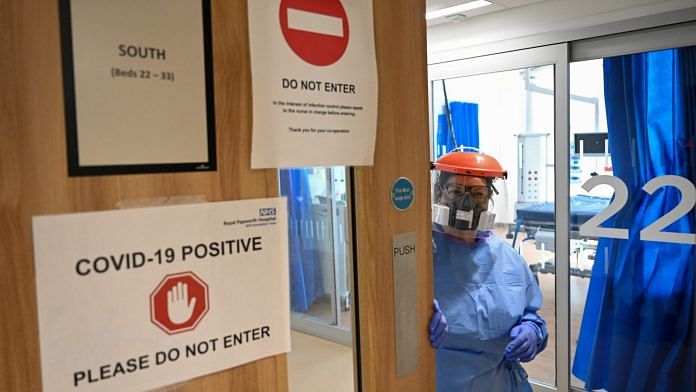New Delhi: People infected with the B.1.1.7. Covid-19 variant — which first emerged in the UK — do not experience worse symptoms or heightened risk of developing long Covid compared to those infected with other strains, according to two studies published in the journal The Lancet Tuesday.
However, B.1.1.7. was found to be more transmissible than other strains, and also caused higher viral load in patients.
The new studies, published in The Lancet Infectious Diseases and The Lancet Public Health, spanned the period between September and December 2020, when B.1.1.7. emerged and began to spread across parts of England.
The studies add to the growing evidence that this strain is more transmissible than the first strain detected in Wuhan, China, in December 2019. Recently, AIIMS director Randeep Guleria said that the mutated virus in India is more infectious, causing a faster spread of the disease.
Also read: Asthma inhalers could reduce severe Covid effects, hospitalisation, study in Lancet reveals
First study
For the study published in The Lancet Infectious Diseases journal, researchers conducted a whole-genome sequencing involving Covid-19 patients in the UK, between 9 November and 20 December 2020.
This was a time when both the first strain (detected in Wuhan) and B.1.1.7. variants were circulating in London and the vaccination programme in the UK was just starting.
The authors compared illness severity in people with and without B.1.1.7 strain and calculated viral load. Among 341 patients who had their Covid test swabs sequenced, 58 per cent had B.1.1.7 and 42 per cent had a non-B.1.1.7. infection.
The team found no evidence of an association between variant and increased disease severity, with 36 per cent of B.1.1.7. patients becoming severely ill or dying, compared with 38 per cent of those with a non-B.1.1.7 strain.
To gain insights into the transmissibility of B.1.1.7., the researchers used data generated by PCR testing of patient swabs to predict their viral load, which describes the amount of virus in a person’s nose and throat.
The data indicated that B.1.1.7. samples contain greater quantities of virus than non-B.1.1.7. swabs.
“One of the real strengths of our study is that it ran at the same time that B.1.1.7. was emerging and spreading throughout London and the south of England,” Dr Eleni Nastouli, from University College London Hospitals NHS Foundation Trust, said in a statement.
“Analysing the variant before the peak of hospital admissions and any associated strains on the health service gave us a crucial window of time to gain vital insights into how B.1.1.7. differs in severity or death in hospitalised patients from the strain of the first wave,” Nastouli said.
Also read: Early orders, more funds, swift payments — govt panel tips for boosting India’s vaccine supply
Second study
The second study, published in The Lancet Public Health journal, analysed self-reported data of 36,920 UK users from a Covid app who tested positive between 28 September and 27 December 2020.
The data from the app was combined with surveillance data from the COVID-19 UK Genetics Consortium and Public Health England to examine associations between the regional proportion of B.1.1.7. infections and symptoms, disease duration, reinfection rates, and transmissibility.
The analysis covered 13 full weeks over the period when the proportion of B.1.1.7. grew most notably in London, South East and East of England.
“We confirmed the increased transmissibility but also showed that B.1.1.7. clearly responded to lockdown measures and doesn’t appear to escape immunity gained by exposure to the original virus,” Dr Claire Steves, Honorary Consultant Physician at King’s College London, UK, who co-led the study, said in a statement.
“If further new variants emerge, we will be scanning for changes in symptom reporting and reinfection rates, and sharing this information with health policymakers,” Steves said.
The analysis found no evidence that reinfection rate was altered by B.1.1.7.
However, the authors found that B.1.1.7. increased the overall reproduction number, or R, by 1.35 times compared with the original strain. R is an indicator of how fast the infection is spreading.
Despite this increase, the analysis reveals that the R was below 1, indicating falling transmission during local and national lockdowns, even in the regions with the highest proportions of B.1.1.7.
Also read: Russia’s Sputnik V vaccine with over 91% efficacy recommended for emergency use in India



